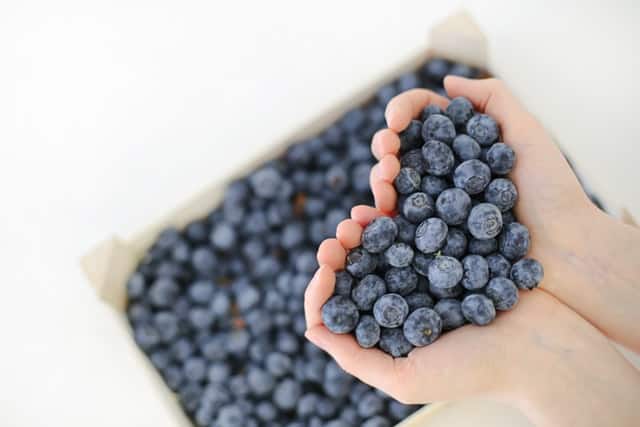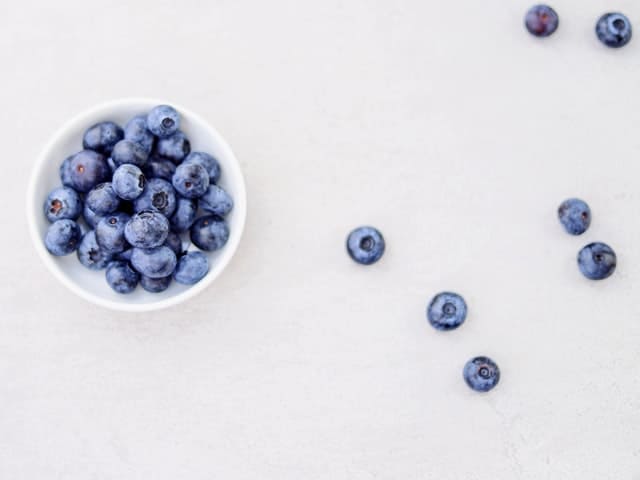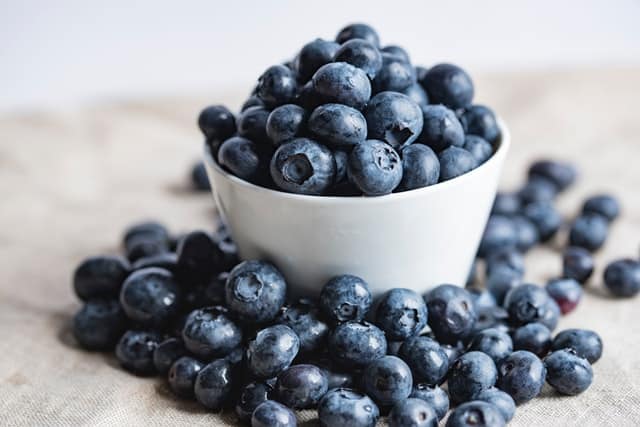I'm sure you've noticed that this fruit often appears as an additive in dog food. Of all the berries (raspberries, blackberries, currants), blueberries have the highest amount of polyphenols and antioxidants, which trap free radicals and protect cell structures.
Contents
Blueberries are the perfect snack for your dog! In addition, an essential component of blueberries is anthocyanin pigments, which improve microcirculation and positively affect a dog's eyesight.
Blueberries are especially recommended for dogs with special nutritional needs:
- Working dogs and sporting dogs - due to its antioxidant properties,
- Dogs at risk of eye problems - as a preventive dietary component,
- Senior dogs - for their properties that inhibit the incidence of macular degeneration and slow down the brain's ageing process.
A healthy diet for your dog should be based primarily on meat, offal, and animal fat. However, the food given to your dog should also include plants, which will be a source of fibre, vitamins, minerals, and valuable substances - including antioxidants with anticancer properties.
We can give our pets various vegetables such as carrots, beet, broccoli, and parsley. Your dog's bowl may also contain various herbs: thyme, rosemary, basil, oregano... Can your dog eat fruit? What fruit is best for your dog, and which ones should you not give him?
Can a dog eat fruit?

Fruit for dogs is an excellent source of health-promoting substances. The antioxidants, flavonoids, and vitamins they contain neutralize free radicals in the body, thus preventing cancer, soothing inflammation, and boosting immunity. They also provide valuable fibre, supporting intestinal peristalsis and preventing digestive problems.
Generally, fruit should make up no more than 5% of a dog's food. However, it's important to remember that fruit contains large amounts of sugars, so frequently giving it to dogs in large quantities may encourage overweight. What fruits can a dog eat, and which will be dangerous for him?
Can a dog eat blueberries?

Blueberries and bilberries are a real vitamin bomb. These fruits primarily contain powerful antioxidants that slow down the body's ageing process, as well as B vitamins, selenium, and zinc. Thanks to that, they positively affect the skin and the brain's functioning. Blueberries and bilberries contain a lot of fibre, which in excess can cause diarrhoea. Therefore, fruits for dogs need to be sensibly dosed.
How many blueberries can my dog eat?

As with any fruit or vegetable, portion size control is essential. Treats should only make up 10% of your dog's diet and be an occasional treat. For most small dogs, 10 blueberries is an adequate amount. Large dog breeds can tolerate more, but keep the 10% ratio in mind when giving them.
Because blueberries are tiny, a large dog will likely eat too many. They tend to eat without chewing, so they may finish the bowl before you know they've grabbed it. This can cause tummy aches or pose a choking hazard. Small dogs can easily choke on berries if swallowed or served frozen.
Many dog owners grow berry bushes in their gardens. Dogs can gobble up sweet berries, so keeping them away from your dog is a good idea. The brushes themselves are not toxic to your dog, but if pesticides or herbicides are on them, they can make your dog sick.
Some dogs (about 10%) may be intolerant or even allergic to new foods. Watch your dog for gastrointestinal upset, chronic gas, itching, ear infections, or hives. If these symptoms occur, stop giving berries and talk to your veterinarian.
Blueberries for dogs - how to give them

You already know whether your dog can eat blueberries - but in what form should you serve them? They are best served raw. Wash the fruit and do it as a treat. You can also make a mousse out of them. However, remember not to add sugar or cream.
It's worth knowing what fruit your dog can eat because, as part of its diet, it can positively impact its health and condition. Can a dog eat blueberries? We stress again that you can include them in your pet's diet as much as possible. This is a great way to support his health.
Methods of feeding Golden Retriever berries

Berries can be used for good behaviour, as a snack on the go, or as part of a meal.
- Frozen Berries
- Mixed Frozen Berries
- Dried berries for a chew snack
- Dried betties mixed with peanut butter in a toy kong make for a good day!
- Blend the berries with yoghurt for a dog-sized smoothie.
- Grate the berries and add them to your regular food.
- Sprinkle whole berries over the food.
How to serve it? 3 ways
- Blueberries are the perfect snack for your dog while training or walking. It's small, low in calories, and - if you seal it in an airtight, small plastic container - easy to transport.
- Blueberries freeze very well, so you can freeze a few portions to support your dog's diet in months with little fruit or give them a cooling snack on hot days.
- Blueberries can also be added to dog food (mashed or simply served whole) or be an ingredient in dog biscuits.
A blueberry snack for your dog should not be a large part of the diet. Generally, fruit should not be given to dogs more than once a day in amounts up to about 5% of the total diet.
In the case of blueberries, this will literally be a few blueberries per day. The amount should be adjusted according to your pet's weight - if in doubt, consult your vet!
Can blueberries harm your dog?

Too many blueberries at once can cause diarrhoea in your dog. It's also worth remembering that although they're small fruits, they contain sugar, which is generally harmful, so it should always be given in moderation.
In rare cases, choking can occur (due to the small size of the fruit).
Can dogs eat blueberries straight from the bush?
Although the blueberries hanging on the bush encourage you to eat them right after picking, you shouldn't do it if you don't wash them first. Blueberries growing in our home garden, eaten without washing, can infect us with parasites whose eggs got (through the urine of other animals) on the fruit's skin.
For dogs, infection with parasites is, in a sense, everyday life. It is enough to lick a clump of grass or even lick their paws after a walk to get infected. Although washing blueberries before giving them to a dog minimizes the risk of parasite infection, the primary prevention is simply regular deworming of the dog.
Can a dog eat blueberry muffins?

While blueberries are healthy for your dog and can be a snack, blueberry muffins, muffins, or any other cake with blueberries is extra sugar that should not be given to your dog. A blueberry muffin won't harm your dog, but it will build up in his bellies.
Blueberries - nutritional values
Blueberries are the most commonly added fruit to dog foods. No wonder - it contains vast amounts of antioxidants, as much as 585 mg /100 g! Blueberries are rich in B vitamins responsible for good skin condition and proper nervous system function.
Selenium and zinc protect against toxic elements, have an oxidizing effect, have a good impact on hormone metabolism, accelerate wound healing, and support vision. Blueberries have also been shown to slow down brain ageing - due to their polyphenol content, which fights free radicals.
What are the health benefits of feeding blueberries to my dog?

Blueberries are packed with vitamins and minerals and have the highest amount of antioxidants of any fruit. That's a lot for such a small berry, but that's not all!
They are also high in fibre, low in calories, and contain phytochemicals and anthocyanins. All of this combined makes them healthy for dogs of all ages.
- Vitamins: Vitamin A, C, and K are found in the little blueberry. They strengthen your dog's immune system, reduce inflammation, promote proper function and condition of the skin, coat, muscles, and nerves and increase bone density.
- Minerals: Calcium, phosphorus, potassium, and magnesium also have their place in blueberries for health. These minerals promote bone growth and the body's ability to use vitamins and minerals more efficiently.
- Phytochemicals: Chemical compounds found in plants. Studies have shown that phytochemicals fight cancer and reduce inflammation in chronic diseases. They are associated with a host of health benefits for both humans and dogs.
- Antioxidants: Blueberries are probably best known for their antioxidant properties, and for a good reason. Antioxidants are an integral part of the diet of both humans and animals. They fight free radicals responsible for cellular and molecular damage and slow the ageing process.
Toxic fruits and other toxic foods for dogs
- Cherries
- Grapes
- Raisins
- Avocados
- Bitter chocolate
- Garlic
- Mushrooms
- Macadamia nuts
- Onions
- holly berries
- Banana plantain
- Juniper berries
- Currant
- Mistletoe berries.
Summary

Blueberries are a delicious fruit with lots of good nutrients and antioxidants that support the body's work and protect your dog from harmful substances. It's worth introducing other fruits into your dog's diet, such as raspberries or cranberries. This is a simple way to ensure that your dog doesn't lack any vitamins or minerals.
It's important to remember that fruit shouldn't dominate your dog's meals because if eaten in large quantities, it can contribute to, for example, being overweight. Fruit can be served fresh, e.g., cut into pieces. Another option, which is also convenient, is to get good dog food with added fruit. Then we have one hundred per cent certainty that the pet will receive them in the right amount.




